- Home
- Samuel Beckett
Watt Page 4
Watt Read online
Page 4
Mr Hackett did not know when he had been more intrigued, nay, he did not know when he had been so intrigued. He did not know either what it was that so intrigued him. What is it that so intrigues me, he said, whom even the extraordinary, even the supernatural, intrigue so seldom, and so little. Here there is nothing in the least unusual, that I can see, and yet I burn with curiosity, and with wonder. The sensation is not disagreeable, I must say, and yet I do not think I could bear it for more than twenty minutes, or half an hour.
The lady also was an interested spectator.
Goff rejoined them, very cross. I recognised him at once, he said. He made use, with reference to Watt, of an expression that we shall not record.
For the past seven years, he said, he owes me five shillings, that is to say, six and ninepence.
He does not move, said Tetty.
He refuses to pay, said Mr Hackett.
He does not refuse to pay, said Goff. He offers me four shillings and fourpence. It is all the money he has in the world.
Then he would owe you only two and threepence, said Mr Hackett.
I cannot leave him without a penny in his pocket, said Goff.
Why not? said Mr Hackett.
He is setting out on a journey, said Goff. If I accepted his offer he would be obliged to turn back.
That might be the best thing for him, said Mr Hackett. Perhaps some day, when we are all dead, looking back he will say, If only Mr Nesbit had accepted—
Nixon, my name is, said Goff. Nixon.
If only Mr Nixon had accepted my four and fourpence that night, and I had turned back, instead of going on.
All lies, I suppose, in any case, said Mrs Nixon.
No no, said Mr Nixon, he is a most truthful man, really incapable, I believe, of telling an untruth.
You might at least have accepted a shilling, said Mr Hackett, or one and six.
There he is now, on the bridge, said Mrs Nixon.
He stood with his back towards them, from the waist up faintly outlined against the last wisps of day.
You haven’t told us his name, said Mr Hackett.
Watt, said Mr Nixon.
I never heard you mention him, said Mrs Nixon.
Strange, said Mr Nixon.
Known him long? said Mr Hackett.
I cannot really say I know him, said Mr Nixon.
Like a sewer-pipe, said Mrs Nixon. Where are his arms?
Since when can’t you really say you know him? said Mr Hackett.
My dear fellow, said Mr Nixon, why this sudden interest?
Do not answer if you prefer not to, said Mr Hackett.
It is difficult to answer, said Mr Nixon. I seem to have known him all my life, but there must have been a period when I did not.
How is that, said Mr Hackett.
He is considerably younger than I, said Mr Nixon.
And you never mention him, said Mr Hackett.
Why, said Mr Nixon, I may very well have mentioned him, there is really no reason why I should not. It is true—. He paused. He does not invite mention, he said, there are people like that.
Not like me, said Mr Hackett.
He is gone, said Mrs Nixon.
Is that so, said Mr Nixon. The curious thing is, my dear fellow, I tell you quite frankly, that when I see him, or think of him, I think of you, and that when I see you, or think of you, I think of him. I have no idea why this is so.
Well well, said Mr Hackett.
He is on his way now to the station, said Mr Nixon. Why I wonder did he get down here.
It is the end of the penny fare, said Mrs Nixon.
That depends where he got on, said Mr Nixon.
He can scarcely have got on at a point remoter than the terminus, said Mr Hackett.
But does the penny fare end here, said Mr Nixon, at a merely facultative stop? Surely it ends rather at the station.
I think you are right, said Mr Hackett.
Then why did he get off here? said Mr Nixon.
Perhaps he felt like a little fresh air, said Mr Hackett, before being pent up in the train.
Weighed down as he is, said Mr Nixon. Come come.
Perhaps he mistook the stop, said Mrs Nixon.
But this is not a stop, said Mr Nixon, in the ordinary sense of the word. Here the tram stops only by request. And since nobody else got off, and since nobody got on, the request must have come from Watt.
A silence followed these words. Then Mrs Nixon said:
I do not follow you, Goff. Why should he not have requested the tram to stop, if he wished to do so?
There is no reason, my dear, said Mr Nixon, no earthly reason, why he should not have requested the tram to stop, as he undoubtedly did. But the fact of his having requested the tram to stop proves that he did not mistake the stop, as you suggest. For if he had mistaken the stop, and thought himself already at the railway station, he would not have requested the tram to stop. For the tram always stops at the station.
Perhaps he is off his head, said Mr Hackett.
He is a little strange at times, said Mr Nixon, but he is an experienced traveller.
Perhaps, said Mr Hackett, finding that he had a little time on his hands, he decided to while it away through the sweet cool evening air, rather than in the nasty railway station.
But he will miss his train, said Mr Nixon, he will miss the last train out, if he does not run.
Perhaps he wished to annoy the conductor, said Mrs Nixon, or the driver.
But a milder, more inoffensive creature does not exist, said Mr Nixon. He would literally turn the other cheek, I honestly believe, if he had the energy.
Perhaps, said Mr Hackett, he suddenly made up his mind not to leave town after all. Between the terminus and here he had time to reconsider the matter. Then, having made up his mind that it is better after all not to leave town just now, he stops the tram and gets down, for it is useless to go on.
But he went on, said Mr Nixon, he did not go back the way he came, but went on, towards the station.
Perhaps he is going home by a roundabout way, said Mrs Nixon.
Where does he live? said Mr Hackett.
He has no fixed address that I know of, said Mr Nixon.
Then his going on towards the station proves nothing, said Mrs Nixon. He may be fast asleep in Quin’s hotel at the present moment.
With four and four in his pocket, said Mr Hackett.
Or on a bench somewhere, said Mrs Nixon. Or in the park. Or on the football field. Or on the cricket field. Or on the bowling green.
Or on the tennis courts, said Mr Nixon.
I think not, said Mr Hackett. He gets off the tram, determined not to leave town after all. But a little further reflexion shows him the folly of such a course. This would explain his attitude after the tram had moved on, and left him.
The folly of what course? said Mr Nixon.
Of turning back so soon, said Mr Hackett, before he was well started on his way.
Did you see the accowterment? said Mrs Nixon. What had he on his head?
His hat, said Mr Nixon.
The thought of leaving town was most painful to him, said Mr Hackett, but the thought of not doing so no less so. So he sets off for the station, half hoping he may miss his train.
You may be right, said Mr Nixon.
Too fearful to assume himself the onus of a decision, said Mr Hackett, he refers it to the frigid machinery of a time-space relation.
Very ingenious, said Mr Nixon.
And what do you suppose frightens him all of a sudden? said Mrs Nixon.
It can hardly be the journey itself, said Mr Hackett, since you tell me he is an experienced traveller.
A silence followed these words.
Now that I have made that clear, said Mr Hackett, you might describe your friend a little more fully.
I really know nothing, said Mr Nixon.
But you must know something, said Mr Hackett. One does not part with five shillings to a shadow. Nationality, family, birthpla
ce, confession, occupation, means of existence, distinctive signs, you cannot be in ignorance of all this.
Utter ignorance, said Mr Nixon.
He is not a native of the rocks, said Mr Hackett.
I tell you nothing is known, cried Mr Nixon. Nothing.
A silence followed these angry words, by Mr Hackett resented, by Mr Nixon repented.
He has a huge big red nose, said Mr Nixon grudgingly.
Mr Hackett pondered this.
You are not asleep, my dear, said Mr Nixon.
I grow drowsy, said Mrs Nixon.
Here is a man you seem to have known all your life, said Mr Hackett, who owes you five shillings for the past seven years, and all you can tell me is that he has a huge big red nose and no fixed address. He paused. He added, And that he is an experienced traveller. He paused. He added, And that he is considerably younger than you, a common condition I must say. He paused. He added, And that he is truthful, gentle and sometimes a little strange. He glared up angrily at Mr Nixon’s face. But Mr Nixon did not see this angry glare, for he was looking at something quite different.
I think it is time for us to be getting along, he said, is it not, my dear.
In an instant the last flowers will be engulfed, said Mrs Nixon.
Mr Nixon rose.
Here is a man you have known as long as you can remember, said Mr Hackett, to whom you lent five shillings seven years ago, whom you immediately recognize, at a considerable distance, in the dark. You say you know nothing of his antecedents. I am obliged to believe you.
Nothing obliges you, said Mr Nixon.
I choose to believe you, said Mr Hackett. And that you are unable to tell what you do not know I am willing to believe also. It is a common failing.
Tetty, said Mr Nixon.
But certain things you must know, said Mr Hackett.
For example, said Mr Nixon.
How you met him, said Mr Hackett. In what circumstances he touched you. Where he is to be seen.
What does it matter who he is? said Mrs Nixon. She rose.
Take my arm, my dear, said Mr Nixon.
Or what he does, said Mrs Nixon. Or how he lives. Or where he comes from. Or where he is going to. Or what he looks like. What can it possibly matter, to us?
I ask myself the same question, said Mr Hackett.
How I met him, said Mr Nixon. I really do not remember, any more than I remember meeting my father.
Good God, said Mr Hackett.
In what circumstances he touched me, said Mr Nixon. I met him one day in the street. One of his feet was bare. I forget which. He drew me to one side and said he was in need of five shillings to buy himself a boot. I could not refuse him.
But one does not buy a boot, exclaimed Mr Hackett.
Perhaps he knew where he could have it made to measure, said Mrs Nixon.
I know nothing of that, said Mr Nixon. As to where he is to be seen, he is to be seen in the streets, walking about. But one does not see him often.
He is a university man, of course, said Mrs Nixon.
I should think it highly probable, said Mr Nixon.
Mr and Mrs Nixon moved off, arm in arm. But they had not gone far when they returned. Mr Nixon stooped and murmured in Mr Hackett’s ear, Mr Nixon who did not like the sun to go down on the least hint of an estrangement.
Drink, said Mr Hackett.
Oh my goodness no, said Mr Nixon, he drinks nothing but milk.
Milk, exclaimed Mr Hackett.
Even water he will not touch, said Mr Nixon.
Well, said Mr Hackett wearily, I am obliged to you, I suppose.
Mr and Mrs Nixon moved off, arm in arm. But they had not gone far when they heard a cry. They stopped, and listened. It was Mr Hackett, crying, in the night, Pleased to have met you, Mrs Nisbet. Mrs Nixon, tightening her hold on Mr Nixon’s arm, cried back, The pleasure is mine, Mr Hackett.
What? cried Mr Hackett.
She says the pleasure is hers, cried Mr Nixon.
Mr Hackett resumed his holds on the armrests. Pulling himself forward, and letting himself fall back, several times in rapid succession, he scratched the crest of his hunch against the backboard. He looked towards the horizon that he had come out to see, of which he had seen so little. Now it was quite dark. Yes, now the western sky was as the eastern, which was as the southern, which was as the northern.
*
Watt bumped into a porter wheeling a milkcan. Watt fell and his hat and bags were scattered. The porter did not fall, but he let go his can, which fell back with a thump on its tilted rim, rocked rattling on its base and finally came to a stand. This was a happy chance, for had it fallen on its side, full as it perhaps was of milk, then who knows the milk might have run out, all over the platform, and even on the rails, beneath the train, and been lost.
Watt picked himself up, little the worse for his fall, as usual.
The devil raise a hump on you, said the porter.
He was a handsome if dirty fellow. It is so difficult for railway porters to keep sweet and clean, with the work they have to do.
Can’t you look where you’re going? he said.
Watt did not cry out on this extravagant suggestion, let fall, it is only fair to say, in the heat of anger. He stooped to pick up his hat and bags, but straightened himself up without having done so. He did not feel at liberty to see to this matter until the porter had finished abusing him.
Mute on top of blind, said the porter.
Watt smiled and clasping his hands raised them to his breastbone and held them there.
Watt had watched people smile and thought he understood how it was done. And it was true that Watt’s smile, when he smiled, resembled more a smile than a sneer, for example, or a yawn. But there was something wanting to Watt’s smile, some little thing was lacking, and people who saw it for the first time, and most people who saw it saw it for the first time, were sometimes in doubt as to what expression exactly was intended. To many it seemed a simple sucking of the teeth.
Watt used this smile sparingly.
Its effect on the porter was to suggest to him words infinitely more disobliging than any he had already employed. But they were never spoken, by him, to Watt, for suddenly the porter seized his can and wheeled it rapidly away. The stationmaster, a Mr Lowry, was approaching.
This incident was of too common a kind to excite any great interest among those present. But there were connoisseurs on whom the exceptional quality of Watt was not lost, of his entry, his fall, his rise and subsequent attitudes. These were content.
Among these was the newsagent. He had seen all from his warm nest of books and periodicals. But now that the best was past he came out on the platform, with the intention of closing his stall, for the night. He therefore lowered and locked the corrugated apron. He seemed a man of more than usual acerbity, and to suffer from unremitting mental, moral and perhaps even physical pain. One noticed his cap, perhaps because of the snowwhite forehead and damp black curly hair on which it sat. The eye came always in the end to the scowling mouth and from there on up to the rest. His moustache, handsome in itself, was for obscure reasons unimportant. But one thought of him as the man who, among other things, never left off his cap, a plain blue cloth cap, with a peak and knob. For he never left off his bicycle-clips either. These were of a kind that caused his trouser-ends to stick out wide, on either side. He was short and limped dreadfully. When he got started he moved rapidly, in a series of aborted genuflexions.
He picked up Watt’s hat and brought it to him, saying, Your hat, sir, I think.
Watt looked at the hat. Was it possible that this was his hat.
He put it on his head.
Now at the end of the platform the newsagent came out of a door, wheeling his bicycle. He would carry it down the winding stone stairs and then ride home. There he would play a game of chess, between masters, out of Mr Staunton’s handbook. The next morning he would carry his bicycle up the stairs again. It was heavy, being a very good bicycle. I
t would have been simpler to leave it below, but he preferred to have it near him. This man’s name was Evans.
Watt picked up his bags and got into the train. He did not choose a compartment. It happened to be empty.
On the platform the porter continued to wheel cans, up and down. At one end of the platform there was one group of cans, and at the other end there was another. The porter chose with care a can in one group and wheeled it to the other. Then he chose with care a can in the other and wheeled it to the one. He is sorting the cans, said Watt. Or perhaps it is a punishment for disobedience, or some neglect of duty.
Watt sat with his back to the engine, which now, having got up steam, drew the long line of carriages out of the station. Already Watt preferred to have his back to his destination.
But he had not gone far when, conscious of eyes upon him, he looked up and saw a large gentleman sitting in the corner diagonally opposed to his. This gentleman’s feet rested on the wooden seat before him, and his hands were in the pockets of his coat. The compartment then was not so empty as Watt had at first supposed.
My name is Spiro, said the gentleman.
Here then was a sensible man at last. He began with the essential and then, working on, would deal with the less important matters, one after the other, in an orderly way.
Watt smiled.
No offence meant, said Mr Spiro.
Watt’s smile was further peculiar in this, that it seldom came singly, but was followed after a short time by another, less pronounced it is true. In this it resembled the fart. And it even sometimes happened that a third, very weak and fleeting, was found necessary, before the face could be at rest again. But this was rare. And it will be a long time now before Watt smiles again, unless something very unexpected turns up, to upset him.

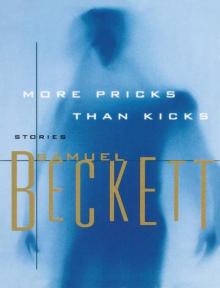 More Pricks Than Kicks
More Pricks Than Kicks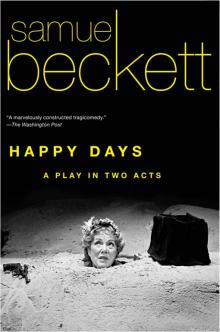 Happy Days
Happy Days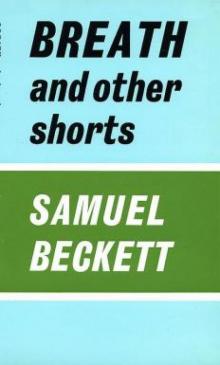 Breath, and Other Shorts
Breath, and Other Shorts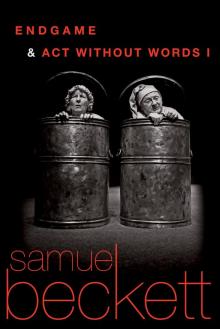 Endgame & Act Without Words
Endgame & Act Without Words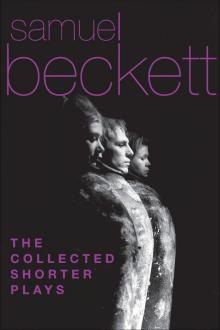 The Collected Shorter Plays of Samuel Beckett
The Collected Shorter Plays of Samuel Beckett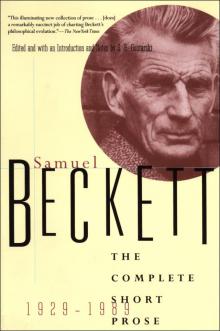 The Complete Short Prose, 1929-1989
The Complete Short Prose, 1929-1989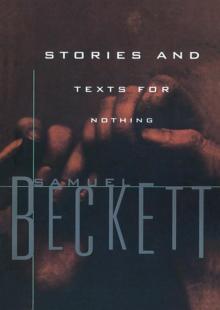 Stories and Texts for Nothing
Stories and Texts for Nothing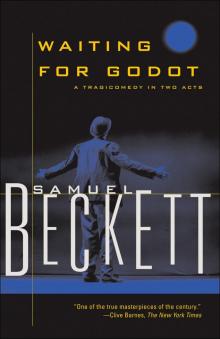 Waiting for Godot
Waiting for Godot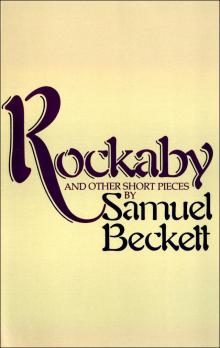 Rockaby and Other Short Pieces
Rockaby and Other Short Pieces First Love and Other Shorts
First Love and Other Shorts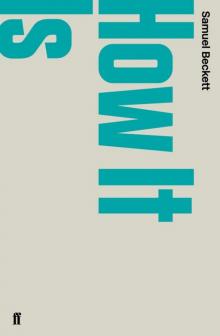 How It Is
How It Is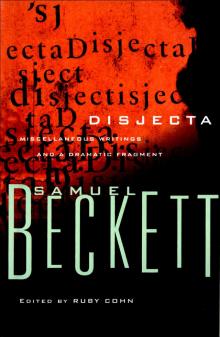 Disjecta: Miscellaneous Writings and a Dramatic Fragment
Disjecta: Miscellaneous Writings and a Dramatic Fragment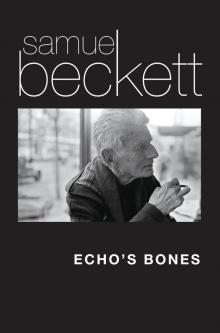 Echo's Bones
Echo's Bones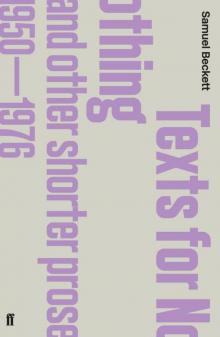 Texts for Nothing and Other Shorter Prose 1950-1976
Texts for Nothing and Other Shorter Prose 1950-1976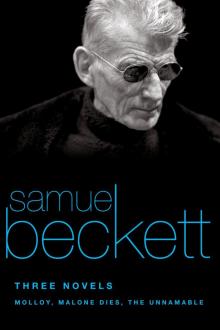 Three Novels
Three Novels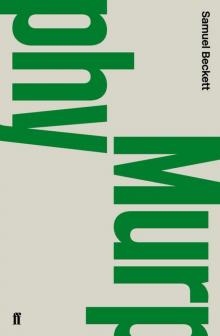 Murphy
Murphy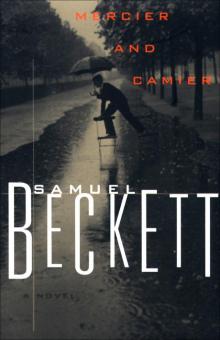 Mercier and Camier
Mercier and Camier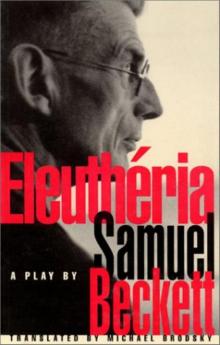 Eleuthéria
Eleuthéria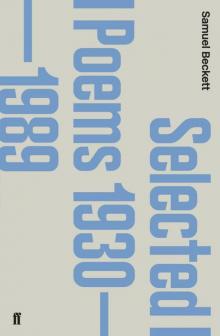 Selected Poems 1930-1988
Selected Poems 1930-1988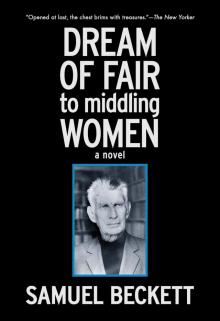 Dream of Fair to Middling Women
Dream of Fair to Middling Women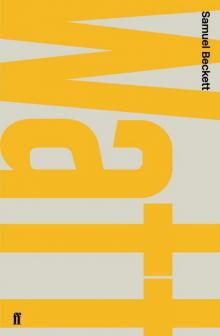 Watt
Watt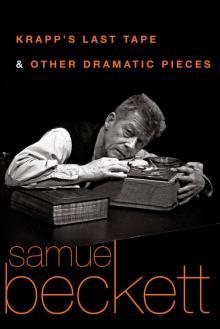 Krapp's Last Tape and Other Dramatic Pieces
Krapp's Last Tape and Other Dramatic Pieces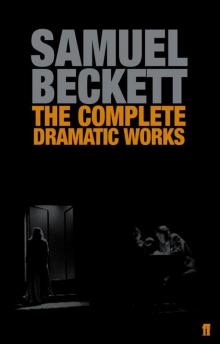 The Complete Dramatic Works of Samuel Beckett
The Complete Dramatic Works of Samuel Beckett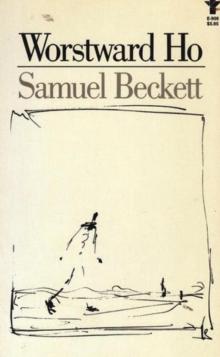 Worstward Ho
Worstward Ho Collected Poems in English and French
Collected Poems in English and French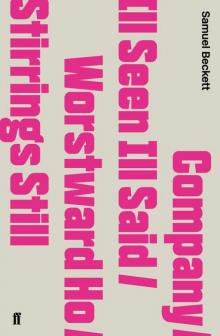 Company / Ill Seen Ill Said / Worstward Ho / Stirrings Still
Company / Ill Seen Ill Said / Worstward Ho / Stirrings Still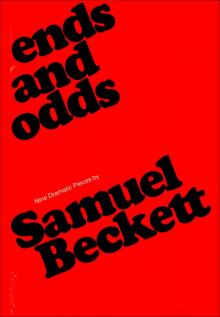 Ends and Odds
Ends and Odds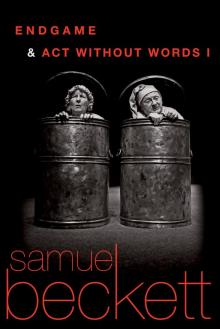 Endgame Act Without Words I
Endgame Act Without Words I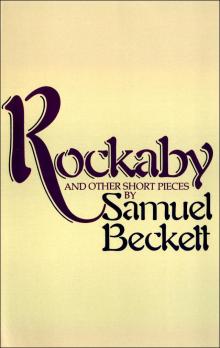 Rockabye and Other Short Pieces
Rockabye and Other Short Pieces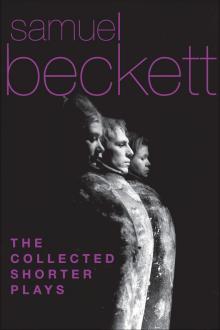 The Collected Shorter Plays
The Collected Shorter Plays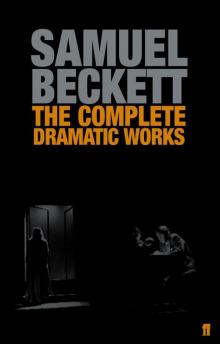 The Complete Dramatic Works
The Complete Dramatic Works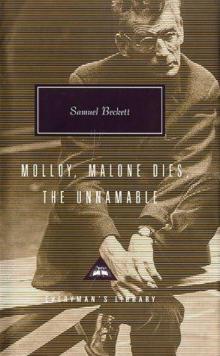 Three Novels: Malloy, Malone Dies, The Unnamable
Three Novels: Malloy, Malone Dies, The Unnamable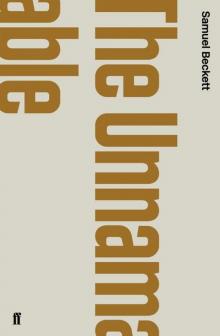 The Unnamable
The Unnamable